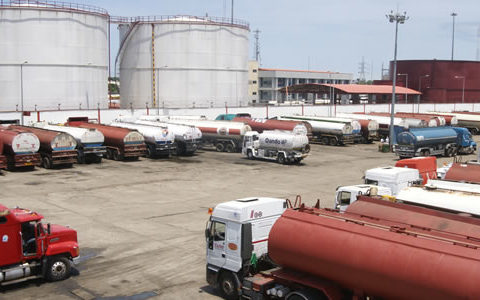Business
Naira slumps as NNPC, oil marketers import 1.5m tonnes of petrol

The Nigerian National Petroleum Company Limited (NNPC) and other oil marketers imported 1.5 million metric tonnes of petrol and 414,018.764 metric tonnes of diesel between October 1 and November 11, 2024, according to a document reviewed by THISDAY.
During this period, the naira weakened further on the parallel market, dropping to N1,740/$ from the previous day’s N1,720/$. Similarly, the NAFEM official exchange rate showed a slight depreciation, closing at N1,652/$ compared to the earlier rate of N1,650/$.
The country’s inflation rate also spiked, with the Consumer Price Index (CPI) rising to 33.88% in October, up from 32.70% in September, according to the National Bureau of Statistics (NBS).
The oil importation data indicated the arrival of 13,500 metric tonnes of jet fuel alongside petrol and diesel imports during the 42-day period. The total value of these products was estimated at $1.9 billion or approximately N3 trillion. The breakdown revealed that 2 billion litres of petrol, 500 million litres of diesel, and 17 million litres of jet fuel were imported.
READ ALSO :NNPCL sacks Umar Ajiya as CFO, announces fresh appointments
Speaking at an event in Lagos, NNPC’s Group Chief Executive Officer, Mele Kyari, highlighted the company’s commitment to reducing dependence on imported refined products. However, NNPC spokesperson Olufemi Soneye clarified that while the company prioritizes sourcing from local refineries, importation would continue based on economic factors.
“Today, NNPC does not import any products; we are taking only from domestic refineries,” Kyari stated. Soneye, however, added: “The GCEO’s statement should not be construed to imply that NNPC is obligated to be the sole off-taker of any refinery or that we will no longer import fuel. While NNPC prioritises sourcing products from domestic refineries, this is contingent upon economic viability.”
The Dangote Refinery, which has advocated for sourcing locally refined products, faces challenges with pricing dynamics, making the transition complex. Aliko Dangote, the refinery’s President, recently disclosed that it holds over 500 million litres of fuel in reserves.
The NNPC’s importation data showed Lagos, Warri, Port Harcourt, and Calabar as key discharge points for refined products. For instance, in October, Lagos received 555,121.617 metric tonnes of petrol, while Warri, Port Harcourt, and Calabar received 281,100, 94,224.821, and 64,000 metric tonnes, respectively. Diesel imports followed a similar trend, with Lagos receiving the highest volume.
The inflation data released by the NBS attributed the rise in headline inflation to increased food and energy prices. Year-on-year inflation climbed to 33.88% in October from 27.33% the previous year, while food inflation soared to 39.16%.
Analysts at Cordros Research linked the persistent inflation to structural issues, including widespread flooding, conflict in the northern region, and rising input costs. “October’s food inflation significantly exceeded the five-year average, underscoring the intensity of price pressures,” the analysts noted.
Looking ahead, Cordros projected sustained inflationary pressures driven by naira volatility and festive demand, with food inflation expected to rise further in November.

























